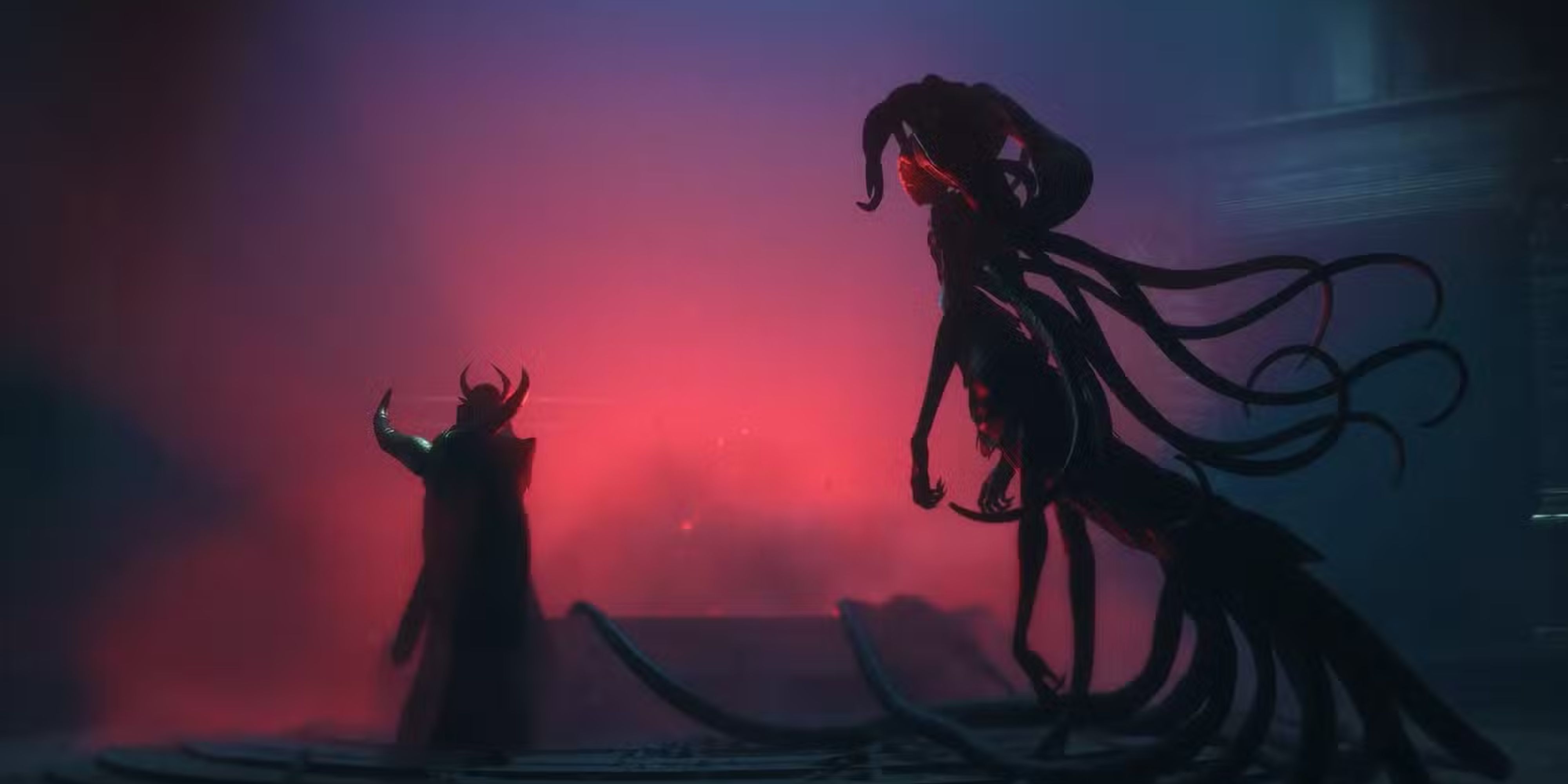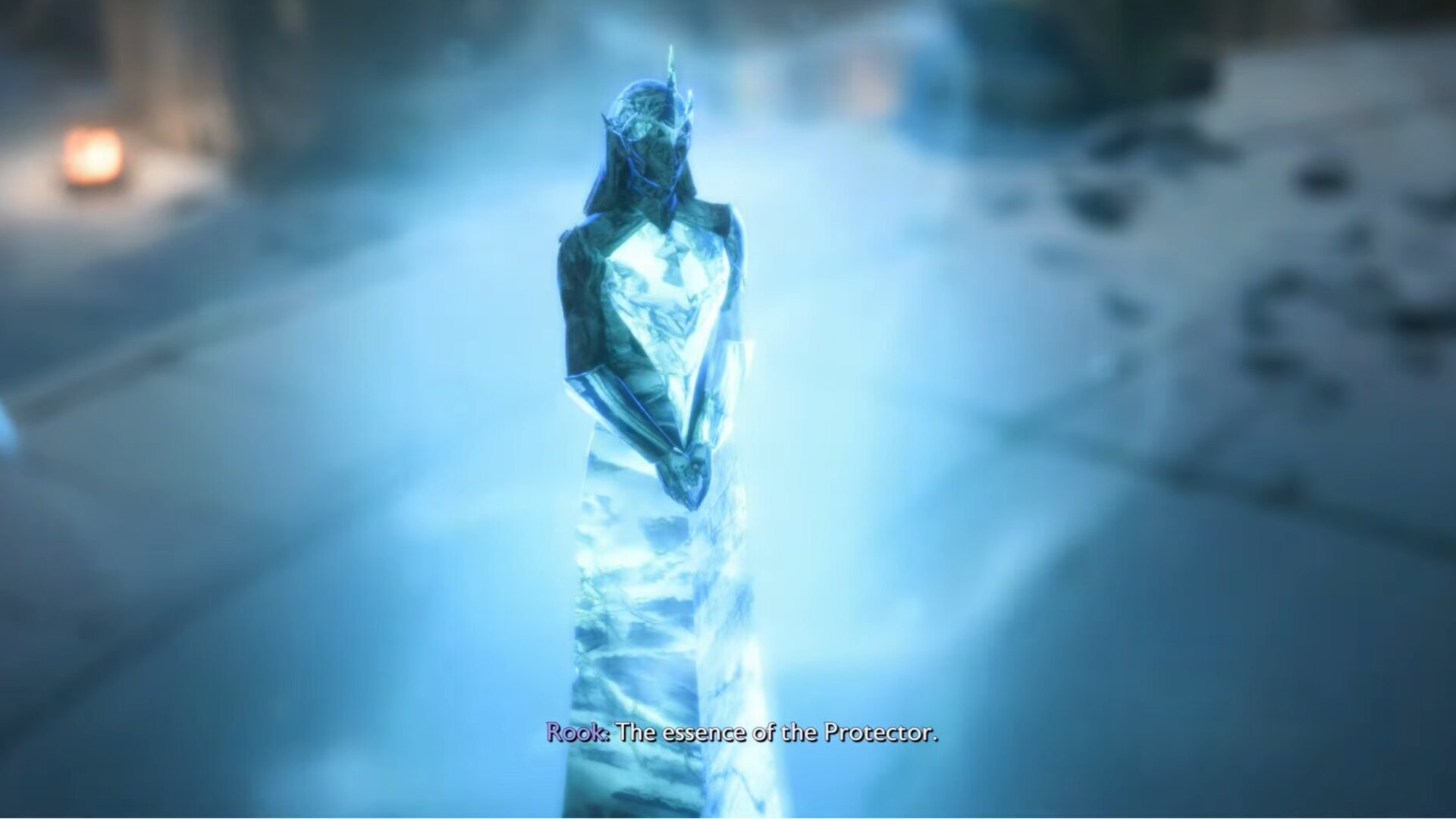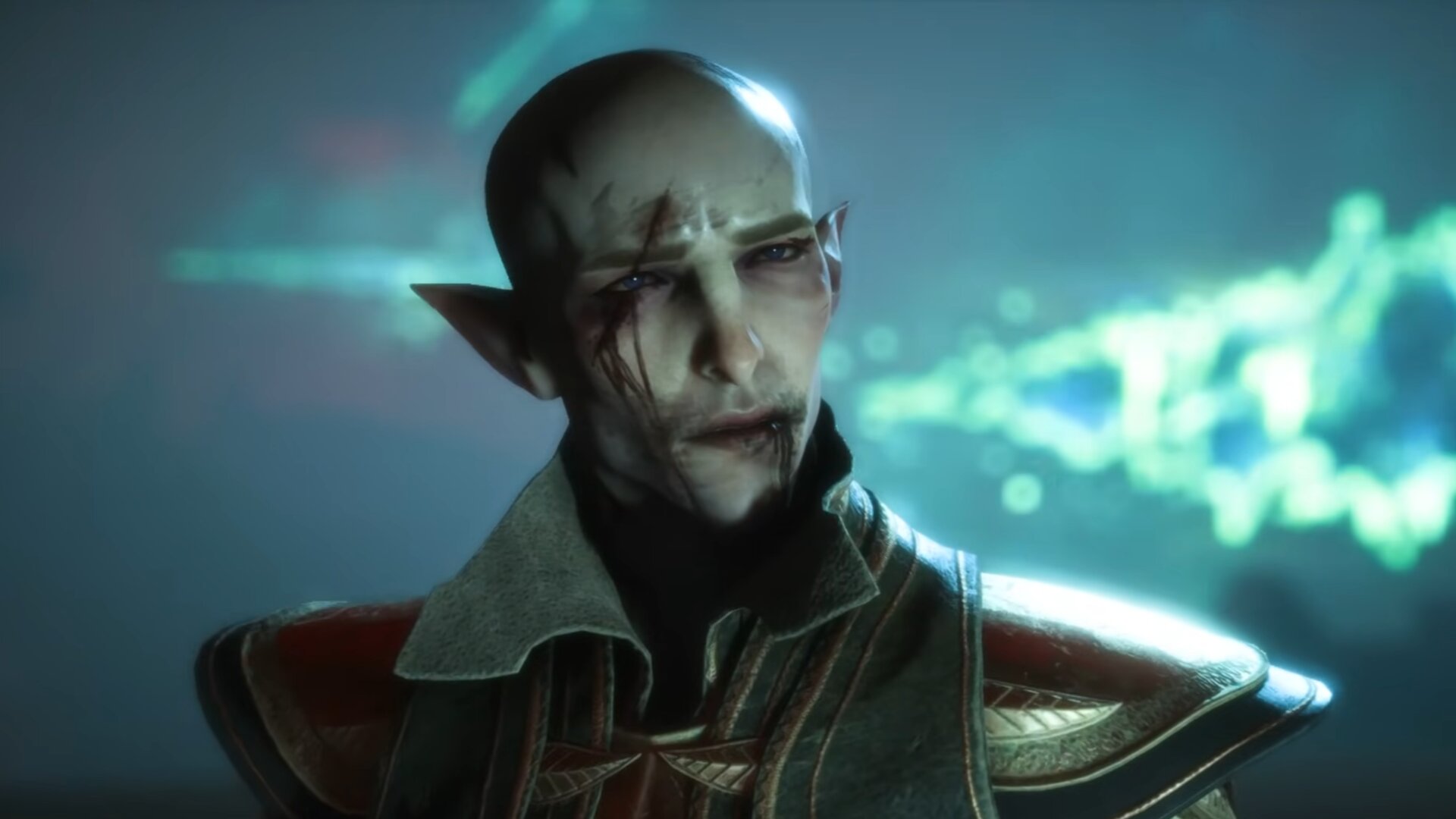
Editor’s note: Today’s offering is from Bat Collazo, a queer Lokean and Heathen of color, author, handcrafter, ritual leader, instructor, and visual artist. Ze is the editor of the Troth’s Loki devotional book, Blood Unbound. Bat has actively practiced Witchcraft and polytheism for over 10 years. Find zir at batcollazo.com.
“Defy the gods. Unite the Veilguard.” This is the tagline for BioWare’s Dragon Age: The Veilguard, released on October 31, 2024 for PS5, Xbox Series X|S, and PC. A single-player fantasy RPG, the plot revolves around a customizable player character, nicknamed Rook, tasked with gathering a ragtag team to protect the world of Thedas from a catastrophic threat to the Veil, a permeable, magical boundary between the embodied world and the realm of spirits, dreams, and the dead.

Promotional image for Dragon Age: The Veilguard [EA]
As a Witch, Pagan, and Heathen who has spent over 100 hours playing through Veilguard, I’ll review and analyze some of the magical, spiritual, and religious themes of the game, which are pulled, in part, from Norse mythology.
In general, the game’s writing is a mixed bag, with good pacing but a clunky structure, some dropped or shallow plot threads, and rare but baffling shifts from excellent to very bad, stilted dialogue, all of which may speak to known critiques of the publisher, EA, and the hardships artists face under capitalism. Even so, when the game is good, it’s breathtaking.
Veilguard won me over with its ability to tell a meaningful story about personhood, balance, and healing connection between embodied mortals and the spirit world.

Bat Collazo’s custom Rook, a non-binary, Latinx elf mage. [EA]
For a deeper look at the game, read on.
Warning for major endgame spoilers ahead.
The disappointing: Killing evil gods
“One would think the gods only exist to die” in popular media, TWH’s own Eric O. Scott observed back in 2016. Indeed, Veilguard is similar, revealing most gods are already dead and pitting two mustache-twirlingly evil polytheistic deities against mortals. (I’ll discuss the more complex depictions later.) Scott theorizes that polytheistic gods are borrowed as safer stand-ins to condemn the real world’s organized religion and hegemonic Christianity, without the controversy that would cause if done directly. That is the exact role played by patriarchal Elgar’nan (called the “All-Father” like Odin, and similarly destined to die at the jaws of the Wolf, but unlike Odin giving Erlkönig or Jareth vibes as a seductive and brutal King of the Elves). The “mad scientist” goddess Ghilan’nain stands in for rampant industry and innovation gone wrong.

Elgar’nan and Ghilan’nain in Dragon Age: The Veilguard [EA]
It’s a bummer that in a fictional world where mortal elves are racialized, oppressed, and enslaved by the powerful institution of the Christian-coded Chantry, the oppressed people’s own polytheistic gods are revealed as the original villains. This is jarring, to say the least, when both in the game as well as in our real world, the “Chantry” demonizes and attempts to eradicate polytheistic worship. In using polytheistic gods as a metaphor for the harms of Christian colonization, the game writes itself into a corner where it unintentionally suggests some of these harms may have been justified.
Predictably, Veilguard left me disappointed with its limited opportunities for healthy polytheistic worship. Please note, by contrast, that players were offered many options for sincere Christian-coded monotheism and prayer in the previous three DA games, including possible romances with several fervent fantasy Catholics, and one religious celibacy path. Veilguard distances itself from this but shifts to become religion-critical overall, centering polytheistic disillusionment as the already-oppressed elves grapple with most of their deities hating and abusing them.
Mythal (a Frigg-inspired goddess) and Solas (a Loki-adjacent antagonist with aspects of Odin and Fenrir) are partial exceptions. However, in Solas’ case, he is untrustworthy for most of the game, and rejects worship when portrayed sympathetically. Only in the “bad ending,” when Solas is at his most vicious and egocentric, does he embrace a deity label, which implies, to my annoyance, that godhood is for the corrupt.
Thanks to religion’s associations with proselytizing, control, and subjugation, I understand why writers often lack a frame of reference for non-dogmatic, free worship of gods (“worth-ship,” the acknowledgment of a god as worthy of loyalty), or what Norse lore, more than once, calls a friendship between gods and their people. I understand why warmth and reciprocity with holy beings is off some people’s radar.
Still annoying, though.
The good: A challenging frith goddess
An exception to the above is the love goddess Mythal, who can be killed in-game but can also have brief but amicable interactions with Rook. Mythal is called the All-Mother, and shares several other parallels with the goddess Frigg, including Frigg’s ties to the Old Norse concept of “frith.”

A symbol of Mythal’s power given to Rook to assist in protecting the worlds in Dragon Age: The Veilguard [EA]
Frith, a word of relationality and the tribal unit, is often translated as “peace,” but as Winifred Hodge Rose describes, this is insufficient: “Elder folk regarded the courageous act of marrying into an enemy clan as frithweaving, which we would indeed regard as ‘peaceweaving’ today. But they also saw vengeance against those who broke through the boundaries of frith—outsiders who damaged their kindred in some way—as being properly supportive of frith.”
Veilguard depicts these relevant themes in Mythal’s characterization as a goddess embodying both benevolence and retribution, often in the context of kinship. Mythal, in an act of frith, departs the spirit world to join her husband in physical embodiment. She takes many lovers and has many children to build spiritual-social ties, and in past games, she seems to share Frigg’s prophetic awareness of all possible timelines as well as Frigg’s refusal to explain this information to others. Depending on gameplay choices, Mythal is also integral to reaching her “old friend” Solas to repair his broken spirit and broken relational ties.
Yet Mythal is also a fierce and vengeful general, who exacts terrible war crimes against the “out group” when her group is threatened. This is the complicated and insidious side of frith. Still, she remains the only self-identified deity in the game who cares for her devotees, and can be convinced to expand her frithstead to include the entire world.
The excellent: Solas and the personhood of spirits
As much as Veilguard struggles with polytheism, when definitions of godhood are set aside and the focus shifts to spirits, I was pleasantly surprised to see some of my own animistic values reflected. This game explicitly condemns Christian-coded fear-mongering and domination as one cause of broken relationships with the dead and Otherworldly spirits, who may become traumatized, unhealthy distortions of themselves in response. Veilguard also knows that summoning and coercing spirits to do one’s bidding is a violation of someone’s personhood and likely to end poorly for everyone involved.
This game also offers options for healthy relationality with beings of all kinds.
Despite some trite conversations between companions in other moments, I found the following examples both hopeful and well-written:
- Harding’s storyline explores the personhood of the land, including honoring her own and the Stone’s collective anger at violation.
- Stubborn kindness toward the unreasonable and punchable First Warden means Rook discovers his Blight-related dementia, in a moving scene with long-term, in-game impacts.
- Adventures with Davrin and Taash center animals as people, not tools.
- In a teatime sidequest reminiscent of the Death Cafe, Rook participates in ancestor veneration with Emmerich, who discloses fear of mortality that coexists with, rather than contradicts, his devotion to caring for the bodies of the dead.
- Taash and other visibly Black characters offer positive nods to certain Indigenous African practices of consensual spirit possession.
- Lucanis survives severe torture only by connecting with an also-imprisoned spirit, a relationship that begins antagonistically but can, with Rook’s support, become one of peaceful solidarity.
Spirits in general, no matter how “inhuman” or seemingly “unintelligent,” are full people with agency in this game—Manfred, wisps, and many others.
Over the course of the game, if players so choose, Rook can nurture healthy relationships across both “sides” of the Veil, dissolving any false and rigid separation, without the need for the world-threatening trauma of “breaking” the Veil. In an understated and touching moment, the “demon” Spite—who, while underutilized as a character, can grow to love Rook—tells Rook that they open doors. This is a layered sentiment, both literal and metaphorical, and parallels beautifully with the game’s themes of the permeable Veil, liberation, and balance.
It’s in the context of this sort of Rook that we should turn to the game’s final villain, Solas, one of the most complex characters of the DA series. Like Loki, Solas is presented as a liminal figure who is both outsider to and numbered among the main pantheon, and who becomes an enemy of the gods when disgusted by their harmful actions.

Loki accusing the gods of hypocrisy in an illustration by W.G. Collingwood (1854-1932) inspired by the Old Norse poem Lokasenna [public domain]

Solas accusing the gods of hypocrisy in a mural memory in Dragon Age: The Veilguard [EA]
Solas is well-intentioned but apocalyptic: a rebel god unaware he’s become a dictator. He has fallen into the trap of using fascism’s own tactics (dehumanization, hopelessness, “the ends justify the means”) for his originally liberatory goals. He vacillates at breakneck speed between helping the player and betraying them, and tends to prevaricate by twisting literal truths, which I found both hilarious and infuriating. Solas’ machinations are based on the belief that balance is impossible, that relationships between mortals and spirits are too broken to salvage, and that this is his fault.
“I seek regeneration,” he says, in the prequel podcast Vows & Vengeance: he wants to tear down the Veil and start over, no matter the devastation. The extremes of Loki as Worldbreaker can be witnessed within Veilguard’s “god of lies, treachery, and rebellion… depending on the story.” One of the worst game endings results in forcibly and physically binding Solas, a temporary fix until the world is destroyed if (when) he breaks free.
Unlike Loki, however, Solas takes himself far too seriously, and prioritizes preserving his own ego and composure. In this vein, Solas is also referred to as the Pride Wolf, a decent translation of the Old Norse “Hróðvitnir,” a name for Loki’s giant wolf son, Fenrir. Another of Solas’ names has a “Fen” reference, and Solas does indeed shapeshift into a gigantic, monstrous wolf.
Finally, Solas is also written with Odinic characteristics: originally a spirit of wisdom, he is delighted by asking and answering questions, obsessed with knowledge, and his long-con schemes to “save” the world involve him setting up his own people to die.
Solas’ endgame redemption option might not work for a mortal character, but in his context, it’s perfect. It’s also the only sustainable solution offered, with every other option making Solas more dangerous in the long run. The redemption ending ties up the game’s lore on the nature of spirits, and offers players a chance to respond to Solas not with mundane tactics but with a powerfully cleansing magical action. It also reminds me of some of Cat Heath’s writing on healing the stories we tell about spirits.
The pleas of loving individuals (the Inquisitor, Varric, Felassan) are insufficient to turn Solas from his destructive path, and threats are even worse. He’s not merely prideful but the corrupted embodiment of Pride, thanks to trauma, the consensus reality of stories told about him, and the lies he has told himself.

Solas near the end of Dragon Age: The Veilguard [EA]
However, Solas’ nature as a spirit can be guided back into a healthier place of Wisdom with the united, collective efforts of:
- someone who represents the hope for a balanced, relational future between mortals and spirits (Rook);
- someone dedicated to intellectual, emotional, and magical understanding of the past (the witch and historian Morrigan—I am unqualified to analyze her parallels with the Irish goddess whose name she shares, but in another Norse reference, she has absorbed the magical knowledge of the Well, all that has come before);
- someone who, as a frithweaver and personification of love, takes accountability for her own past crimes with and against Solas, and frees him from his magical and emotional shackles, healing his ability to connect with others (Mythal);
- someone who, years ago, stunned Solas with the realization that embodied people’s brief lives have value, and who is loyal to him even now (the Inquisitor).
Together, these four, as people and as magical forces, free Solas from his distorted spiritual purpose. The subtleties of Solas’ writing, voice acting, and animation in this scene are heart-wrenching. When bound, Solas is untrustworthy and his sacred role is twisted beyond recognition, but when unbound he chooses to become the life force of the Veil, protecting all worlds and working to ease the contamination and suffering he helped cause.
This reminds me of Vé, “sacred enclosure,” one of Loki’s bynames, and Solas’ commitment is similar to the ending of Marvel’s Loki TV series, where Loki rejects authoritarianism and chooses to become the World Tree, holding all timelines. In both of these inspired modern stories, the Loki figure no longer seeks escape and apocalypse, but instead ties himself willingly to supporting the sustenance and freedom of all beings.
I still cry if I think about this Veilguard scene.
Conclusion
Dragon Age: The Veilguard is an imperfect game with some awkward moments, and conflates godhood and worship with domination. But spiritually, it tells a different, better story. From my Pagan point-of-view, Veilguard is often a delight, with options to befriend, defend, and fall in love with spirits, fight against the exploitation of plants, animals, the land, the dead, and Otherworldly beings, and repair relationships with them, with mutual agency and personhood.
Dragon Age: The Veilguard offers a story where balance is possible, and where someone who believes apocalypse is the only remaining option can be proven wrong.
It’s better, the game says, to do something different, no matter how far down a terrible path you have gone. No sunk cost fallacy. Start now. We need more stories like this in the world.
The Wild Hunt is not responsible for links to external content.
To join a conversation on this post:
Visit our The Wild Hunt subreddit! Point your favorite browser to https://www.reddit.com/r/The_Wild_Hunt_News/, then click “JOIN”. Make sure to click the bell, too, to be notified of new articles posted to our subreddit.